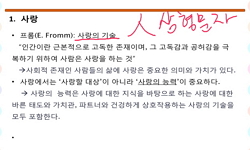The purpose of the study is to verify the moderating effect of self-leadership in the effect of self-esteem of university students on career adaptation. Through this, it is meaningful to provide data for improving career adaptability by increasing sel...
http://chineseinput.net/에서 pinyin(병음)방식으로 중국어를 변환할 수 있습니다.
변환된 중국어를 복사하여 사용하시면 됩니다.
- 中文 을 입력하시려면 zhongwen을 입력하시고 space를누르시면됩니다.
- 北京 을 입력하시려면 beijing을 입력하시고 space를 누르시면 됩니다.
https://www.riss.kr/link?id=T16383070
- 저자
-
발행사항
제주 : 제주대학교 교육대학원, 2022
-
학위논문사항
학위논문(석사) -- 제주대학교 교육대학원 , 상담심리전공 , 2022. 8
-
발행연도
2022
-
작성언어
한국어
- 주제어
-
KDC
372.61 판사항(6)
-
발행국(도시)
제주특별자치도
-
기타서명
The Effects of Self-esteem by university students on Career adaptation: Focusing on Moderating Effects of Self-leadership
-
형태사항
viii, 69 p. : 삽화, 표 ; 30 cm
-
일반주기명
지도교수: 최보영
권말부록: 설문지
참고문헌 : p. 52-60 -
UCI식별코드
I804:49002-000000010740
- 소장기관
-
0
상세조회 -
0
다운로드
부가정보
다국어 초록 (Multilingual Abstract)
Research question: Is Self-leadership effective in the relationship between Self-esteem and Career adaptation in university students?
The population of this study was conducted online due to the spread of COVID-19, and the population randomly sampled a total of 481 four-year university students nationwide. Data collection took place over about four days from September 6 to 9, 2021, and 430 data were collected and used for the final analysis, excluding 51 copies of data that exceeded the response and response time of 481. The measurement tool used a self-report questionnaire consisting of self-esteem, career adaptability, self-leadership scale, and demographic characteristics survey questions.
The data collected in this study were analyzed using SPSS for Windows 25.0, SPSS Process Macro v4.0, a statistical analysis program. Reliability analysis was conducted to verify the reliability of the self-esteem, career adaptability, and self-leadership scale. In addition, frequency analysis and percentage were calculated to find out the characteristics of the variables, and correlation analysis was conducted between each variable to confirm the relevance and direction between each variable. Hierarchical regression analysis was conducted to verify how self-leadership plays a controlling role in the effect of self-esteem on career adaptability. In addition, a hierarchical regression analysis was conducted by creating an interaction term between self-esteem and self-leadership. Based on these analysis results, the results of this study are summarized as follows:
First, as a result of conducting correlation between self-esteem, career adaptation, and self-leadership, there was a positive correlation between self-esteem, career adaptation, and self-leadership.
Second, as a result of hierarchical regression analysis to verify the moderating effect of self-esteem and career adaptation, self-leadership was found to have a moderating effect in the relationship between self-esteem and career adaptation.
Third, as a result of hierarchical regression analysis to verify the moderating effect of self-leadership sub-variables in the relationship between self-esteem and career adaptation, the moderating effect of behavior-oriented strategies was confirmed.
Taken together, it was confirmed that self-leadership acts as an important variable in the relationship between self-esteem and career adaptation, and that self-leadership acts as a modulating variable between these two variables. The results suggest that in-depth and multilateral follow-up studies should be conducted to improve self-leadership in order to increase university students' career adaptability.
The purpose of the study is to verify the moderating effect of self-leadership in the effect of self-esteem of university students on career adaptation. Through this, it is meaningful to provide data for improving career adaptability by increasing self-esteem. In addition, the purpose is to improve university students' ability to cope with their careers and improve their quality of life by cultivating self-leadership and improving their career adaptation. In order to achieve this research purpose, the research questions were set as follows.
Research question: Is Self-leadership effective in the relationship between Self-esteem and Career adaptation in university students?
The population of this study was conducted online due to the spread of COVID-19, and the population randomly sampled a total of 481 four-year university students nationwide. Data collection took place over about four days from September 6 to 9, 2021, and 430 data were collected and used for the final analysis, excluding 51 copies of data that exceeded the response and response time of 481. The measurement tool used a self-report questionnaire consisting of self-esteem, career adaptability, self-leadership scale, and demographic characteristics survey questions.
The data collected in this study were analyzed using SPSS for Windows 25.0, SPSS Process Macro v4.0, a statistical analysis program. Reliability analysis was conducted to verify the reliability of the self-esteem, career adaptability, and self-leadership scale. In addition, frequency analysis and percentage were calculated to find out the characteristics of the variables, and correlation analysis was conducted between each variable to confirm the relevance and direction between each variable. Hierarchical regression analysis was conducted to verify how self-leadership plays a controlling role in the effect of self-esteem on career adaptability. In addition, a hierarchical regression analysis was conducted by creating an interaction term between self-esteem and self-leadership. Based on these analysis results, the results of this study are summarized as follows:
First, as a result of conducting correlation between self-esteem, career adaptation, and self-leadership, there was a positive correlation between self-esteem, career adaptation, and self-leadership.
Second, as a result of hierarchical regression analysis to verify the moderating effect of self-esteem and career adaptation, self-leadership was found to have a moderating effect in the relationship between self-esteem and career adaptation.
Third, as a result of hierarchical regression analysis to verify the moderating effect of self-leadership sub-variables in the relationship between self-esteem and career adaptation, the moderating effect of behavior-oriented strategies was confirmed.
Taken together, it was confirmed that self-leadership acts as an important variable in the relationship between self-esteem and career adaptation, and that self-leadership acts as a modulating variable between these two variables. The results suggest that in-depth and multilateral follow-up studies should be conducted to improve self-leadership in order to increase university students' career adaptability.
국문 초록 (Abstract)
연구문제. 대학생의 자아존중감과 진로적응성의 관계에서 셀프리더십은 조절효과가 있는가?
본 연구는 코로나19 확산으로 인하여 온라인 조사로 진행되었으며, 모집단은 전국 4년제 대학생 총 481명을 임의 표집하였다. 자료수집은 2021년 9월 6일부터 9일까지 약 4일에 걸쳐 이루어졌으며, 481명중 불성실 응답 및 응답시간 초과된 51부의 자료를 제외하고 430명의 자료가 회수되어 최종분석에 사용되었다.
측정도구는 자아존중감, 진로적응성, 셀프리더십 척도 및 인구통계학적 특성 조사문항으로 구성된 자기보고식 설문지를 사용하였다.
본 연구에서 수집한 자료는 통계분석 프로그램인 SPSS for Windows 25.0, SPSS Process Macro v4.0을 활용하여 분석하였다. 자아존중감, 진로적응성, 셀프리더십 척도의 신뢰도 검증을 위하여 신뢰도 분석을 실시하였다. 그리고 변인의 특성을 알아보기 위하여 빈도분석 및 백분율을 산출하였고, 각 변인 간의 관련성을 확인하기 위해서 변인 간 상관분석을 실시했다. 자아존중감이 진로적응성에 미치는 영향을 검증하기 위해 위계적 회귀분석을 실시하였고, 자아존중감과 셀프리더십의 상호작용항을 만들어 조절효과를 검증했다. 마지막으로 셀프리더십의 각 하위변인의 조절효과를 확인했다. 이러한 분석결과를 바탕으로 본연구의 결과를 요약하면 다음과 같다.
첫째, 자아존중감, 진로적응성, 셀프리더십의 상관분석을 실시한 결과 자아존중감, 진로적응성, 셀프리더십 모두 정적 상관을 보여주었다.
둘째, 자아존중감과 진로적응성의 관계에서 셀프리더십의 조절효과를 검증하기 위해 위계적 회귀분석을 실시한 결과 자아존중감과 진로적응성의 관계에서 셀프리더십은 조절효과가 있는 것으로 나타냈다.
셋째, 자아존중감과 진로적응성의 관계에서 셀프리더십 하위변인인 행동중심적 전략, 자연적 보상전략, 건설적 사고전략의 조절효과를 검증하기 위해 위계적 회귀분석을 실시한 결과 자아존중감과 진로적응성의 관계에서 행동중심적 전략의 조절효과를 확인했다.
연구 결과를 종합해보면 자아존중감과 진로적응성의 관계에서 셀프리더십은 중요한 변인으로 작용하고 있으며, 이 두 변인들의 사이에서 셀프리더십이 조절변인으로 작용하고 있음을 확인할 수 있었다. 그 결과는 대학생의 진로적응성을 높이기 위해서 셀프리더십을 함양하고 행동중심적 전략을 증진시키기 위한 심층적이고 다각적인 후속연구들이 이루어져야 함을 시사한다.
본 연구에서는 대학생의 자아존중감이 진로적응성에 미치는 영향에서 셀프리더십의 조절효과를 검증하고자 하였다. 이를 통하여 자아존중감을 높여 진로적응성의 향상을 위한 자료를 제공...
본 연구에서는 대학생의 자아존중감이 진로적응성에 미치는 영향에서 셀프리더십의 조절효과를 검증하고자 하였다. 이를 통하여 자아존중감을 높여 진로적응성의 향상을 위한 자료를 제공하며 셀프리더십 수준을 증가시켜 진로적응성을 함양함으로써 대학생들의 진로에 대한 대처능력을 높이고, 삶의 질을 증진시킬 수 있도록 하는데 그 목적이 있다. 이러한 연구목적을 달성하기 위해 연구문제를 다음과 같이 설정하였다.
연구문제. 대학생의 자아존중감과 진로적응성의 관계에서 셀프리더십은 조절효과가 있는가?
본 연구는 코로나19 확산으로 인하여 온라인 조사로 진행되었으며, 모집단은 전국 4년제 대학생 총 481명을 임의 표집하였다. 자료수집은 2021년 9월 6일부터 9일까지 약 4일에 걸쳐 이루어졌으며, 481명중 불성실 응답 및 응답시간 초과된 51부의 자료를 제외하고 430명의 자료가 회수되어 최종분석에 사용되었다.
측정도구는 자아존중감, 진로적응성, 셀프리더십 척도 및 인구통계학적 특성 조사문항으로 구성된 자기보고식 설문지를 사용하였다.
본 연구에서 수집한 자료는 통계분석 프로그램인 SPSS for Windows 25.0, SPSS Process Macro v4.0을 활용하여 분석하였다. 자아존중감, 진로적응성, 셀프리더십 척도의 신뢰도 검증을 위하여 신뢰도 분석을 실시하였다. 그리고 변인의 특성을 알아보기 위하여 빈도분석 및 백분율을 산출하였고, 각 변인 간의 관련성을 확인하기 위해서 변인 간 상관분석을 실시했다. 자아존중감이 진로적응성에 미치는 영향을 검증하기 위해 위계적 회귀분석을 실시하였고, 자아존중감과 셀프리더십의 상호작용항을 만들어 조절효과를 검증했다. 마지막으로 셀프리더십의 각 하위변인의 조절효과를 확인했다. 이러한 분석결과를 바탕으로 본연구의 결과를 요약하면 다음과 같다.
첫째, 자아존중감, 진로적응성, 셀프리더십의 상관분석을 실시한 결과 자아존중감, 진로적응성, 셀프리더십 모두 정적 상관을 보여주었다.
둘째, 자아존중감과 진로적응성의 관계에서 셀프리더십의 조절효과를 검증하기 위해 위계적 회귀분석을 실시한 결과 자아존중감과 진로적응성의 관계에서 셀프리더십은 조절효과가 있는 것으로 나타냈다.
셋째, 자아존중감과 진로적응성의 관계에서 셀프리더십 하위변인인 행동중심적 전략, 자연적 보상전략, 건설적 사고전략의 조절효과를 검증하기 위해 위계적 회귀분석을 실시한 결과 자아존중감과 진로적응성의 관계에서 행동중심적 전략의 조절효과를 확인했다.
연구 결과를 종합해보면 자아존중감과 진로적응성의 관계에서 셀프리더십은 중요한 변인으로 작용하고 있으며, 이 두 변인들의 사이에서 셀프리더십이 조절변인으로 작용하고 있음을 확인할 수 있었다. 그 결과는 대학생의 진로적응성을 높이기 위해서 셀프리더십을 함양하고 행동중심적 전략을 증진시키기 위한 심층적이고 다각적인 후속연구들이 이루어져야 함을 시사한다.
목차 (Table of Contents)
- Ⅰ. 서 론 1
- 1. 연구의 필요성 및 목적 1
- 2. 연구문제 및 가설 7
- 3. 연구 모형 8
- 4. 용어의 정의 8
- Ⅰ. 서 론 1
- 1. 연구의 필요성 및 목적 1
- 2. 연구문제 및 가설 7
- 3. 연구 모형 8
- 4. 용어의 정의 8
- 가. 자아존중감 8
- 나. 진로적응성 9
- 다. 셀프리더십 9
- Ⅱ. 이론적 배경 10
- 1. 자아존중감 10
- 가. 자아존중감의 개념 10
- 나. 대학생의 자아존중감 12
- 2. 진로적응성 13
- 가. 진로적응성의 개념 13
- 나. 대학생의 진로적응성 16
- 3. 셀프리더십 17
- 가. 셀프리더십 개념 17
- 나. 대학생의 셀프리더십 20
- 4. 자아존중감, 진로적응성, 셀프리더십의 관계 21
- 가. 자아존중감과 진로적응성의 관계 22
- 나. 셀프리더십과 진로적응성의 관계 22
- Ⅲ. 연구 방법 25
- 1. 연구대상 25
- 2. 측정도구 27
- 가. 자아존중감 척도 27
- 나. 진로적응성 척도 28
- 다. 셀프리더십 척도 30
- 3. 자료분석 31
- Ⅳ. 연구 결과 및 해석 33
- 1. 주요변인의 기술통계 33
- 가. 자아존중감의 기술통계 33
- 나. 진로적응성의 기술통계 34
- 다. 셀프리더십의 기술통계 35
- 2. 주요변인들 간의 상관관계 35
- 3. 자아존중감과 진로적응성의 관계에서 셀프리더십의 조절효과 37
- 가. 자아존중감과 진로적응성의 관계에서 셀프리더십 전체의 조절효과 37
- 나. 자아존중감과 진로적응성의 관계에서 셀프리더십의 하위변인 중 행동중심적 전략의 조절효과 40
- 다. 자아존중감과 진로적응성의 관계에서 셀프리더십의 하위변인 중 자연적 보상전략의 조절효과 43
- 라. 자아존중감과 진로적응성의 관계에서 셀프리더십의 하위변인 중 건설적 사고전략의 조절효과 44
- Ⅴ. 논의 및 결론 46
- 1. 논의 46
- 2. 결론 50
- Ⅳ. 참고문헌 52
- Abstract 61
- 부록(설문지) 64










